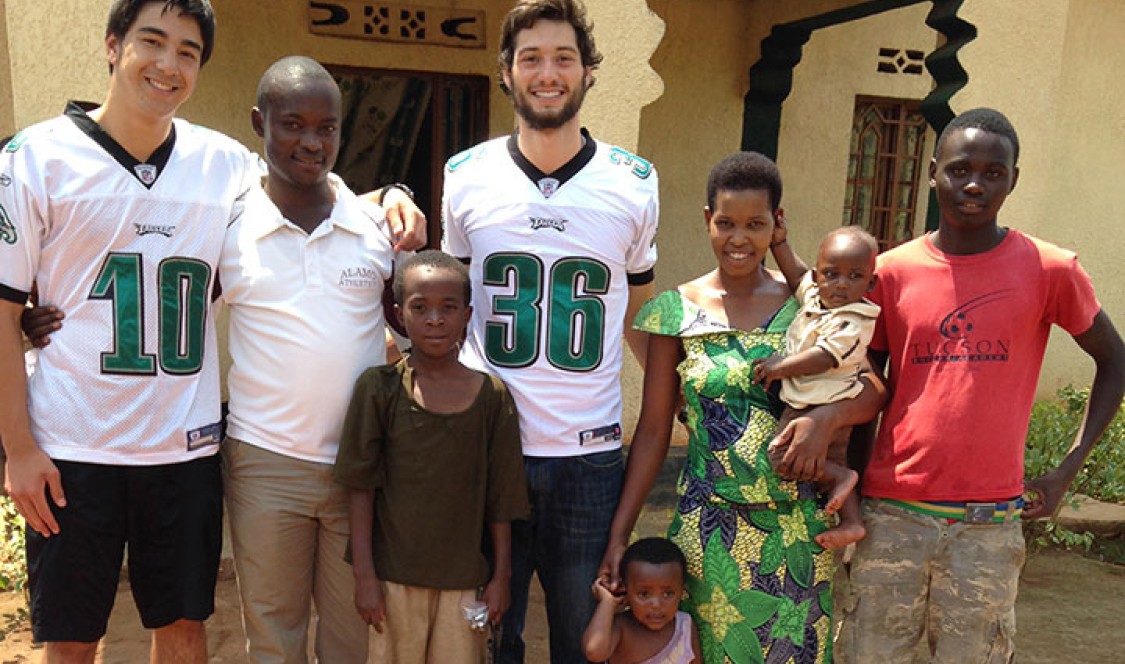This past summer, two CMC students, Ben Fusek ‘17 and Zachariah Oquenda ‘16, embarked on a two-month journey to rural Rwanda through ThinkImpact. ThinkImpact is a social entrepreneurship organization that provides students the opportunity to engage in experimental learning as they work in rural communities to test ideas and prototype changing innovations.
The Kravis Leadership Institute (KLI) has partnered with ThinkImpact since 2013 to provide CMC students the opportunity to take part in the Innovation Institute, an 8-week internship at one of its partnered rural communities. KLI covers the cost of the ThinkImpact tuition, which includes teaching materials and training, travel, meals, and housing. At the core of ThinkImpact is the Innovation Institute. The Institute is rooted in the belief that every community has assets and every person has skills that can be leveraged to stimulate sustainable development initiatives. ThinkImpact currently works in rural communities in Rwanda, Panama, and South Africa.
Over the course of a summer, students live in rural communities, learning about social entrepreneurship. In collaboration with locals, students identify opportunities and co-create products and services with a social impact. Student program participants set off on what ThinkImpact calls “a journey to put into practice leadership skills, intercultural communication, and creative problem solving.”
In some instances, scholars and community members test new products and services that may be sold through social enterprises, which are managed and sustained locally. Zachariah Oquenda ’16 worked with four of the ThinkImpact Community Organizers on a project to increase government transparency and community communication. His team focused on researching and building a platform to organize cellular telephone numbers and data according to village.
Ben Fusek ’17 describes the cultural and linguistic training they received as well as business and innovation curriculum before heading out to the rural community he was working with. He accounts how “[he] witnessed firsthand the many prevalent social issues that affect much of the impoverished region, namely malnutrition, disease, and the lack of access to both clean water and education.” He and his partner assembled a team of local community members and worked together to address these challenges through the creation of a market-based business.
Fusek had a tireless and eventful couple of months in Rwanda. “We worked with translators to conduct four meetings a week with our team, teaching business skills and working tirelessly to develop a sustainable crop storage, preservation and distribution system with the goal of increasing accessibility to nutritious crops within the village while turning a profit for the team,” said Fusek.
Zachariah Oquenda ‘16 recalls the results he and his team produced fondly. “My last day in Kigali, Rwanda, the capital, our team pitched this idea to two national governmental offices: Ministry of Health and the Ministry of Information and Communication Technology, said Oquenda. “Both gave the idea great praises fully officially support the project, offering political power to push the project, as well as promising funding pending research report.”
He is still in touch with the young men he worked with, as they “have taken the reigns, and the project, as is best, is run by and for Rwandans.” Oquenda remarks, “I feel good about having been there to help get them excited, but they are fully capable of making tremendous change.”
It was an eye-opening experience for both students, as they lived with a homestay family and learned about local customs and traditions. They got to immerse themselves in the community whether it was through playing soccer or spending time with interacting with the children in the village. Most important of all, it inculcated self-belief.
“The program has taught me that] if you believe in something, go for it. Even when others think you will fail, or if you think you might fail, you must just get over yourself and move on,” Oquenda says.

